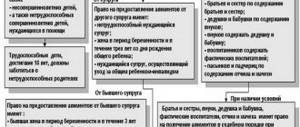If former spouses who have a common child are unable to agree on its maintenance, the controversial issue is resolved in court. Currently, the law allows two ways of conducting the process in court: through a lawsuit and by order. The second method is much more profitable compared to lawsuit proceedings, as it is simple and efficient.
Therefore, this option is more preferable. To do this, you should write an application to the court to issue an order to collect alimony payments, and after 5 days the court will issue the corresponding document.
The legal significance of the order is essentially equal to a writ of execution. Therefore, its provisions must be implemented without delay. At the same time, this type of production has its own “undercurrents”. Thus, the law provides for various cases where the process cannot be used.
In addition, drawing up and submitting an application is accompanied by a number of subtleties that should be studied before starting the process. One of them includes the possibility of filing an objection to a court order for the collection of alimony; a sample is given in the article.
Is it possible to cancel a court order?
It is most convenient to consider the answer to this question in the form of an example.
The woman filed a corresponding application with the court. The court is given only five days to issue the order. Such a short period is explained by the fact that neither the applicant nor the defendant is called to consider the case, and the court makes its decision independently. It is issued in the form of an order, which is sent to both parties.
The alimony payer who received the document has the right to raise his objections to it. The law provides ten days for this action. If he files an objection to the relevant court order for the collection of alimony within the period provided by law, the document is subject to cancellation.
Important! Such an action is possible only upon filing an application for a court order. In legal proceedings with a claim to overturn a court decision, you will have to draw up a corresponding claim (or appeal).
In addition, payments that have already been paid on the basis of a writ of execution, a court order, or even an agreement voluntarily drawn up by a notary between the parties can be challenged in the same way.
What should the claimant do if the order is cancelled?
According to Article 129 of the Civil Code of the Russian Federation, cancellation of a court order for alimony is possible if you submit an application to the magistrate’s court, which made the previous decision. It goes without saying that there must be compelling circumstances for this to happen.
It is important to understand the following: canceling a court order does not exempt you from paying alimony. Most likely, after this, a claim for alimony will be filed. Parents can resolve this issue in another, more loyal way - by drawing up a voluntary agreement on the payment of alimony.
- Conclusion of a voluntary agreement between spouses, certified by a notary. For conscientious parents, this option will be the best, since it requires the least amount of time and stress. In addition, parents have the right to independently agree on the amount of amounts and the timing of their payment.
- By filing a claim in court. The most complex procedure for assigning alimony, due to certain circumstances of a particular proceeding. For example, evasion of payments by a parent who does not live with the child.
- Take the initiative to create an order for the collection of alimony. In terms of complexity, among the three presented methods, this one is average. Its implementation is more suitable for former spouses who remain in normal human relationships. The advantages of such an initiation are the speed of obtaining the relevant document, the absence of litigation, and the involvement of third parties (lawyer, witnesses) in the case is not required.
To obtain a court order for the collection of alimony, the following procedure must be followed:
- collect documents confirming the right to demand alimony (divorce certificate, birth certificate);
- draw up an application of the appropriate form;
- apply with documents to the court (magistrate);
- receive an order or express a request to transfer the latter to bailiffs.
If the relationship between the former spouses is not going well and the person to whom the order is addressed can draw up an application to cancel the alimony order (a sample is attached below).
Is there any way to cancel a child support order? Possible under certain conditions.
If the plaintiff (the person obligated to make payments for child support) acts as interested in canceling the order, he can indicate the following reasons in the statement of challenge:
- Disagreement with the assigned payment amount.
- Dissatisfaction with the deadlines within which payments must be made.
- General disagreement with imposing an obligation to support a child by making payments.
- Other reasons (must be exclusively legitimate).
The important point is that the period of ten begins to count not from the moment of adoption of the judicial act that is being appealed, but from the day of receipt of such a document. The date on which one of the parents, who is obligated to pay child support, became familiar with the order is confirmed by a seal and signature on a registered letter, and a signature on the courier delivery documents.
In order for the court to accept an application to cancel the prescribed payments, the deadline is of paramount importance. If the time allotted for challenging was missed without good reason, the application cannot be satisfied.
Cancellation of a court order for the collection of alimony that has entered into legal force can occur in court or by order of a magistrate (when the deadline for appeal has been missed for compelling reasons).
Valid reasons for missing a deadline include:
- The objection could not take place because the person was undergoing inpatient treatment in a medical institution. Your stay in the hospital is confirmed by a sick leave certificate.
- The mail message containing the court order was received by a third party, and not by the recipient himself (for example, a cohabitant or neighbors).
- The registered letter was not received at all. If the person obligated to pay, for some reason (for example, the letter indicated an incorrect address, or perhaps the recipient purposefully avoided receiving it) learned about the existence of a document containing such an obligation from the bailiffs, then the period for appeal starts from the day of familiarization with the document in court.
When receiving an application about missed deadlines for protesting for good reasons (despite how much time has passed since the return of the registered letter with notification to the court - a month, six months), the judge can proceed in two ways:
- immediately cancel and revoke execution by issuing an appropriate order (applied in most cases);
- provide a new ten-day period for appeal.
If a person filed an application after 10 days, and the deadline was missed for unjustifiable reasons (for example, simple inaction), the order can only be appealed through judicial proceedings if there are compelling reasons and evidence (for example, it is an established fact that there is no relationship between the parent-alimony payer and the child for whose account payments were made).
Even if a reason is indicated in the application, which the court regards as valid, a period of more than twelve months should not pass from the moment it ends, otherwise the court cannot cancel the imposed obligation to collect alimony.
We invite you to familiarize yourself with: Child support debt, conditions and procedure for its collection
To the magistrate of the judicial district (indicating the number)
Address (district, city, street, courthouse number)
Full name of the applicant
Applicant's address
OBJECTION
execution of a court order
On April 11, 2021, I received court order No. 13_ dated April 03, 2021, issued by the magistrate of judicial district No. 3__ of the Omsukchan district of the Magadan region to collect alimony payments from my income on account of the child Igor Stepanovich Krasnov, born on July 31, 2009.
I object to the execution of the order addressed to me, since at the moment a lawsuit is pending in court to establish the fact that there is no relationship between me and Igor Stepanovich Krasnov.
Based on the above, as well as articles 128-129 of the Civil Procedure Code of the Russian Federation.
Cancel the court order No. 13_ dated 04/03/2017, issued by the magistrate of court district No. 3__ of the Omsukchan district of the Magadan region on the recovery of alimony payments from my income on account of the child Igor Stepanovich Krasnov, born on 07/31/2009.
04/13/2017 signature (Krasnov S.A.)
The petition must be written in accordance with a certain structure and content elements:
- Details of the addressee of the application (full name, position, name of the procedural body).
- Full name, dates of birth, addresses, telephone numbers of the claimant and the defendant.
- Accurate information about the court order (where, by whom and when it was issued, about what).
- The date on which the applicant was notified of the order imposing an obligation on him to participate in the maintenance of the child.
- The reasons why the person makes this application.
- Clearly stated requirements.
- Date, signature.
If the refutation is not properly formatted, it may be rejected and not considered by the court.
In order for the court to satisfy a protest, the following are recognized as valid grounds:
- unstable and low financial position of the parent obligated to pay child support;
- dishonesty of the parent who initiated the assignment of alimony (for example, leading an immoral lifestyle);
- refutation of the fact of the existence of family ties between the applicant and the child for whose account alimony was assigned;
- the applicant is dependent on one or more third parties (this fact often serves as a basis for revising the amount of penalties);
- recognition of the applicant as incapacitated;
- availability of documents confirming the adoption of the child for whom alimony was assigned by a third party;
- good financial situation of the claimant (taken into account by the court in rare situations and cannot serve as a basis for releasing the parent from the obligation to support the child, but can serve to reduce the amount of payment down to the minimum);
- comprehensive financial support for the child is provided at the expense of state benefits;
- the child in whose account alimony is assigned reaches the age of eighteen;
- the debtor does not have his own home and spends most of his income on renting living space.
The above list of reasons is not exhaustive. The court may recognize other reasons indicated by the defendant in the application as valid.
In turn, the defendant may apply to the court to suspend the accrual of alimony for the duration of the trial.
If, based on the results of the case on the assignment of alimony, considered by the court, a decision is made to satisfy the claim, all payments subject to collection for the period for which payment was suspended, the defendant is obliged to compensate and pay off the debt.
If the defendant is conscientious and continues to make contributions to the account of a minor child, despite the initiation of a case to cancel alimony, even in the event of a satisfactory decision in such a case, the amounts that were transferred to the child cannot be returned.
A court order for the collection of alimony attracts attention due to the simplicity of the registration procedure, receipt and short issuance time. However, if there is no normal relationship between the former spouses, this method of imposing an obligation to support a minor child will only lead to an increase in the period before the start of deductions.
Reasons
How to revoke a court order for alimony payments
Canceling an order is very simple. To do this, the person obligated for alimony must take into account the following points.
- Meet the ten-day deadline provided by law.
- Prepare an application and send it to the court.
- In addition, you can contact the bailiffs with a request to terminate the enforcement proceedings based on the cancellation of the order.
The alimony payer also has the right to revoke the order. Moreover, unlike the alimony payer, he has the right to do this at any time when he considers it necessary. To do this, he just needs to contact the bailiffs with a corresponding statement. But this statement does not deprive him of the right to apply this document again in order to again receive payments from the defendant.
Application for cancellation of an order for the collection of alimony (sample)
There is no specific form prescribed by law for applying for a court order. But there are general standards for this type of paper that the applicant must adhere to. In accordance with them, the application must contain information such as:
- name of the judicial authority and name of the judge;
- information about the applicant (his name, as well as his place of residence);
- the title of the document, which is written in the middle;
- a descriptive part, which indicates a reference to the order, as well as the reasons for its cancellation (such as, for example, challenging the amount of alimony);
- corresponding request;
- date and signature.
The signature is affixed personally by the applicant who objects to the issued court document. This can also be done by his representative, but only if this action is authorized by a power of attorney certified by a notary.
Important! Submitting such a document is a responsible step that must be carried out without error. Therefore, if in doubt, it is better to seek professional help from lawyers specializing in these issues.
You can find out how to write an objection to a claim for alimony, a sample of which is provided below.
Unlike this document, the objection to the statement of claim to reduce the amount of alimony, a sample of which see below, is drawn up differently.
A sample statement of claim to cancel a court order for alimony can be downloaded here
Grounds for canceling an order
When deciding to cancel a court order on alimony obligations, the judge considers the following circumstances:
- Disability of the second spouse resulting from the abuse of alcoholic beverages, drugs or the commission of an intentional crime.
- Unworthy behavior of the recipient of alimony in family relationships.
- Short marriage. The judge takes into account a period of up to 5 years, depending on the reasons for the divorce and the age of the spouses.
- Inadequate performance of parental responsibilities, including by a stepmother or stepfather.
- Presence of a child under 18 years of age in the new marriage of the payer.
- Difficult financial situation of the alimony payer. If it is impossible to pay a certain amount, it is allowed to apply for a review of the amount of payments.
There must be compelling reasons to overturn a court decision:
- Difficult financial situation of the payer.
- If there is another dependent in the family, the payer is not able to transfer the specified amount.
- Serious health condition.
- Lack of income - in this case, alimony payments may be suspended temporarily until circumstances change.
If we are talking about collecting alimony in favor of parents, then the basis for canceling the order may be:
- Inappropriate behavior of parents towards their child.
- The parents were deprived of parental rights.
- A parent has committed a crime against their child.
- The parent did not pay child support at the time.
It goes without saying that these are not all the reasons why a court decision can be revoked - the facts presented will be considered by the court and a decision will be made.
Please note that if the assignment of alimony was carried out not by a court order, but by a statement of claim, then the latter can only be canceled by filing a counterclaim in the same court.
Deadlines to cancel an order
The alimony payer has ten days to file an objection. Moreover, cancellation will follow regardless of what reasons, in the applicant’s opinion, are the basis for cancellation. In any case, this indicates a conflict between the alimony payer and the recipient of payments.
And in such circumstances, the case cannot be decided within the framework of summary proceedings provided for the issuance of an order. Therefore, it is subject to consideration by the court in the form of a claim.
If the child support order is canceled
As a rule, an application to cancel a child support order is considered by a judge alone and within a matter of days. If it is satisfied, a separate ruling is issued and sent to the parties.
In the future, the collection of alimony after the cancellation of the court order involves filing a separate claim in court, which will be considered according to the general rules prescribed in the Code of Civil Procedure.
Thus, you need to be prepared for the fact that a claim for alimony will be filed.
Accordingly, the procedure will take place according to the rules of claim proceedings.
How is the 10-day period for filing an objection calculated?
Initially, when an order is issued, the exact date on which it will enter into force is not announced. The reason for this is that the period for filing an objection granted to the payer begins to expire only from the moment the order is delivered to him. Moreover, he must sign about this fact.
But from the moment of delivery of the order exactly ten days are calculated. Objections filed during this period are mandatory to cancel it.
If no objections are received from the defendant, then the document can be submitted to the bailiff service.
Attention! The collection of alimony begins from the time of the opening of enforcement proceedings in this case. In addition to alimony, the payer will have to pay a state fee for the consideration of the relevant application for the issuance of an order by the court.
If the deadline for appeal is missed
There are all sorts of situations in life. At the same time, there is always an option to resolve the issue regarding the timing of appealing a court order.
For example, a man learns that there is an order for alimony when a writ of execution arrives at his work and the accounting department begins to make periodic monthly deductions. Then the natural question will be how to cancel a child support order if 10 days have passed?
Everything here is extremely simple. It is necessary, along with the objection to cancel the alimony order, to send to the court a petition to restore the time for appeal.
It must indicate that the citizen did not know about the court order, the mail did not deliver it to him. You can also give other valid reasons.
You can ask to restore the deadline directly in the application to cancel the order. Then all the prerequisites for this should be stated there.
As a rule, they learn about the order after the bailiff receives a decree to initiate enforcement proceedings against the work and the money is withdrawn from the salary.
Under such circumstances, you can point out that if you did not receive the order. Then you need to come to the magistrate’s court and receive it in your hands, and the countdown will begin from the moment of delivery.
However, it should be remembered that restoring the period for reviewing the court order is not the duty, but the right of the magistrate. Therefore, the more convincingly you can outline the reasons for missing time to appeal, the greater the likelihood of a positive resolution of the issue.
Skipping the period to object
A ten-day period is a short period of time to appeal to a judicial authority with an objection to a statement of claim for the collection of alimony in a fixed amount or to the corresponding court order. Therefore, defendants often skip this period in life. Depending on the circumstances, the period may be extended. The court considers this issue in each case separately.
The most common situations where the defendant misses the period established by law include the following.
- The payer of alimony payments received the document and signed it. He took no action in this regard, but decided to object after ten days. Then the period provided for by law cannot be extended, since there is no valid reason for the objection (as well as for a claim for the recovery of alimony in a fixed sum of money).
- The alimony obligee received the document, but did not have the opportunity to object to it for a real valid reason, which is confirmed in the form of a document. This basis allows the applicant to request, at his own discretion:
- restoration of the deadline for good reason with the provision of documents confirming this fact;
- cancellation of the order document.
- The alimony obligee did not receive an order to assign alimony payments. The bailiffs, who opened proceedings in the case, informed him about this. Typically, this document is sent by registered mail with return receipt requested. In this case, the person to whom it is addressed comes to the post office to receive an envelope.
But in any business there is always a human factor, due to which mistakes can be made. For example, an incorrect address is specified. It also happens that the alimony payer specifically avoids receiving it. Then the letter is returned to the judicial authority. And the ten-day period will begin to expire from the time the order was received in court.
It is important to take into account that we are talking directly about the court, but not about the FSSP. Therefore, even if he is in this service, and the bailiffs have opened the corresponding proceedings, the order is canceled when appropriate objections are received (if the above period is met). The same applies to an appeal against a magistrate’s decision on alimony. That is, in fact, a sufficient period of time may have already passed.
- The order was not delivered to the person to whom it was addressed, but to another person, for example, a relative or a person living next door. In this case, the actions should be similar to those described above. You should file an objection with the judicial authority and state that the document was not served on the alimony payer, but on an outsider.
Thus, in accordance with Art. 112 of the Code of Civil Procedure of the Russian Federation, the period provided for an objection that was missed can be restored by the court in a number of cases.
To achieve this, you need to file an application with the court having jurisdiction and indicate a request to restore the deadline. In this case, it is necessary to state the circumstances (valid reasons) due to which the time was missed. Documentary evidence of the fact shall be attached to the application. The grounds for the objection must also be stated.
The application is considered by both parties in court. However, if they are absent, this is not a reason not to engage in business. After examination, the court makes a decision to grant or deny the request. The document can also be appealed by either party in accordance with the general procedure.
How is the appeal period calculated for the payer?
To appeal a court order, the defendant is given 10 days to file an objection.
The writ of execution is canceled regardless of what objections were provided, since the fact of the controversial situation between the plaintiff and the defendant is considered in a lawsuit. The moment of entry into legal force is difficult to determine, because the countdown begins from the day the writ of execution is delivered to the debtor by mail with notification.
The defendant must do the following within 10 days of receiving the order:
- prepare a competent, legally correct objection;
- apply to the judicial authority without missing the deadline.
If the payer does not provide an objection, the document is sent for execution to the FSSP authorities.
The debtor has the right to appeal the order after 10 days if:
- Due to valid reasons, the defendant could not file an objection within the prescribed period (illness, military service in the armed forces, business trip, relocation, etc.).
- The citizen did not receive the document by mail due to circumstances beyond his control.
If the executive document has entered into legal force, the appeal occurs by appealing to the cassation instance of the judicial authority, by submitting a complaint, in accordance with the provisions of Chapter 41 of the Code of Civil Procedure of the Russian Federation.
The application is drawn up in writing and in three copies - for the court, the second party to the case and the bailiff.
The statement states:
- details of the court, data of the judge;
- information about the debtor and the collector (full name, address, telephone);
- details of the writ of execution (number, date of issue);
- information about the alimony obligations themselves (payment order, amount);
- the date on which the plaintiff received the order;
- grounds and reasons for cancellation;
- signature of the payer, date of application.
Lawyers advise focusing the judge’s attention on such grounds as the presence of dependents, lack of income, serious health conditions, etc. In addition, you can report disagreement with the assigned monthly payment amount and payment terms.
Additional documents are attached to the objection, depending on the grounds for canceling the order:
- a copy of the employment contract, with a mark indicating that the debtor was fired;
- a certificate confirming the payer’s disability or incapacity for work, both temporary and permanent;
- documents indicating the presence of dependents (birth certificate, witness statements, bank statements);
- doubt about blood relationship (requirement to establish paternity, undergo a DNA test).
To terminate the order, only one written request from the payer is sufficient.
If the deadline established by law for appealing a court order is missed, the alimony payer has the right to apply for its restoration. This requires compelling reasons.
Possible reasons why a deadline may be missed:
- the debtor received the document, but due to being on a business trip or exacerbation of the disease, he was unable to appeal to the court on time;
- the defendant did not receive the letter due to problems with the mail or improper design of the envelope;
- the court or the other party did not notify the debtor of the order while he was already in the bailiff service;
- improper performance of duties by postal workers.
According to the law, deadlines can be restored only if there are serious circumstances for missing them, documented. The defendant may refer to illness, being in another city, receiving mail by other persons, etc.
The application may contain several demands - for the restoration of the term and the simultaneous cancellation of the court order. But it will be better if the alimony provider provides two different documents and simultaneously sends them to the court.
What is indicated in the application:
- court details;
- plaintiff’s details (full name, address, contact phone number);
- reasons for missing the deadline and evidence supporting them.
The application is submitted to the magistrate's court, where a court order imposing alimony obligations was issued. The petition is considered in the presence of the claimant and the debtor. If one of the parties does not appear at the court hearing, this will not affect the course of the case in any way. The judge has the right to satisfy the plaintiff’s application and restore the missed deadline or refuse due to unjustifiable reasons or insufficient evidence provided.
Once a court order has been sent to the payer, it can also be quashed if the mother wants to withdraw it. This usually happens if the child moves to live with his father, or the parties managed to reach a peaceful agreement.
Payments are withheld from the payer's income on the basis of a writ of execution. Its type depends on the procedure used by the child’s parents:
- Adults draw up a settlement agreement on their own. The document specifies the terms and amount of payments that are acceptable to both parties. In order for the agreement to become legally binding, it must be certified by a notary.
- A court order is issued as a result of litigation between parents. The process can drag on for several months and requires personal participation of the parties at meetings.
- A court order is issued within 5 days after the plaintiff submits an application. The presence of parents is not required when the decision is made.
The assignment of alimony by court order is, at first glance, a simple procedure. However, there are limitations to the cases in which it can be used.
The order is issued on the basis of an application filled out by the interested person in whose care the children remain. In addition, it is necessary to familiarize the court with documents that confirm the child’s relationship with the defendant. For example, a child’s birth certificate or paternity certificate.
Citizens whose life circumstances fall under the following criteria have the right to take advantage of the simplified procedure for collecting alimony:
- the amount of alimony is a certain percentage of the defendant’s income;
- the payer has no other alimony obligations;
- paternity has been officially confirmed.
Judges have the right to make a positive verdict only if the case satisfies all the above criteria. It should be noted that the presence of an undissolved marriage relationship is not an obstacle to issuing an order. But when challenging paternity, this option will not work.
After receiving a court order for alimony, the defendant can file an objection if he does not agree with it. The law for this purpose provides 10 days, during which the defendant must apply to the judicial authorities. However, the applicant is not required to convince anyone that there are compelling reasons for this.
We invite you to read: Is it possible to enter into an inheritance by proxy for another person? Mandatory expenses and payments; Samples and templates of documents.
Not only the payer, but also the recipient of alimony payments can write an objection. Its advantage in this process is that it is not limited by any time frame. The only thing he needs for this is to submit an application to cancel the court order to the bailiff service.
In the event that a court decision regarding the procedure for paying child support, its amount or the fact of its establishment does not suit the recipient or payer, the latter can always express their disagreement. To do this, they will need to draw up and file an objection to the court order. How to do this correctly? What documents should I collect? More about this.
Reasons
If the defendant decides to appeal the order to collect alimony payments, he needs to contact the magistrate, writing an objection in his name. The following circumstances may be grounds for writing this statement:
- loss of ability to work by the payer (injury, serious illness, disability, etc.);
- difficult financial situation (the defendant lost his job or was transferred to a lower-paid position, he has nowhere to live, etc.);
- adoption of a child for whose maintenance money is paid;
- the child reaches adulthood;
- the payer still has minor children under his financial care;
- the recipient has a reputation as an unscrupulous person (uses “child” alimony for his own needs, does not properly fulfill his parental responsibilities, etc.);
- there are doubts regarding the relationship of the minor and the payer, requiring a genetic examination.
All these reasons matter only to the defendant himself - these are possible motives for disagreeing with the order. You can object to it without giving any reasons.
Documentation will be needed after the court order is canceled during the lawsuit process. In addition to the objection itself, the applicant will have to present to the magistrate copies of his passport and a court order for the recovery of child support payments issued earlier.
Documents confirming the facts stated in the application will be required:
- copies of birth certificates of the payer’s other children;
- a copy of the new marriage certificate;
- certificates from medical institutions indicating a deterioration in the defendant’s health, a certificate of disability, etc.;
- certificate of registration as unemployed or decreased income;
- documents confirming the fact of loss of housing (certificate from the Ministry of Emergency Situations about a fire or natural disaster, certificates from the Federal Migration Service and an extract from the house register about a change in place of registration and residence, etc.).
Sample
The legislation does not provide a uniform template for writing an objection to a judge’s order to pay alimony, so the application is written in any form. The document must contain the following points:
- information about the court (division number) and the judge (last name, first name and patronymic) who will consider the claim (the court division is the same as the one that issued the order);
- information about the claimant and the defendant (last name, first name and patronymic, address registration, contacts);
- the exact date of adoption of the court order for alimony;
- date of receipt of the order by the defendant;
- grounds for cancellation of the document;
- statement of the request to cancel the judge's order;
- date, month and year of filing the objection;
- applicant's signature.
Consequences of canceling an order by law
If the court decides to cancel the order, the corresponding document is sent to both parties. It is sent to the bailiffs if it is necessary to open proceedings.
When making a ruling, the judge explains to both parties that they have the right to file documents with the court again. But the applicant will have to draw up and submit a claim. The plaintiff has the right to ask the court that recovery be carried out not from the moment the claim is filed, but from the moment the initial request for an order is issued.
Then they submit not only the necessary documents in the general case, but also attach an application for extradition, as well as a decision to cancel based on an objection received from the defendant. If the alimony obligee does not agree with the plaintiff, the objection to the statement of claim to reduce the amount of alimony or on other grounds is drawn up differently than in simplified proceedings.
Which is better: an application for an order or a claim for alimony?
There is a difference between these two documents, and it is significant. For example, this concerns the timing of consideration of applications. If in the case of an order the period is only five days, then a whole month is provided for the consideration of the claim. Moreover, this period is often delayed for various reasons.
In addition, consideration of a case by way of claim proceedings involves a conversation between the parties and court hearings.
Therefore, a more convenient option for the recipient of alimony is to apply to the magistrate’s court with an application for the issuance of an order. At the same time, there are circumstances in which this is impossible. For example, if the alimony payer:
- there is no stable income, officially confirmed;
- earnings are irregular or absent altogether;
- paid in kind or in foreign currency;
- in a number of other cases, when the amount received violates the interests of any of the parties, the issue is resolved in favor of determining a fixed sum of money or part of the alimony in such an amount, and the other part in shares.
In one case or another, the court’s decision will be made exclusively in the manner of claim proceedings.
Is it possible to cancel a court order?
Suppose the mother filed an application with the court for an order to pay child support.
The court has only 5 days to consider the stated claim and make a decision. Why such a short period? The court does not invite the mother and father to the hearing, but personally considers the application and documents submitted by the applicant. Based on the results of the consideration, the court makes a decision and formalizes it in the form of an order for the payment of alimony. The court order is sent to the payer and recipient of alimony.
The alimony payer who has received a court order has the right to object to it. The law allocates only 10 days for this. If you timely file an objection with the court, you can cancel the court order (Article 129 of the Code of Civil Procedure).
Note! If alimony obligations were imposed on the payer in a claim rather than a writ proceeding, they can only be canceled by filing a lawsuit in court. If alimony payments have already been paid (regardless of the type of enforcement document - a court decision, a court order, even a voluntary agreement), the obligations can also be challenged only through a lawsuit.







